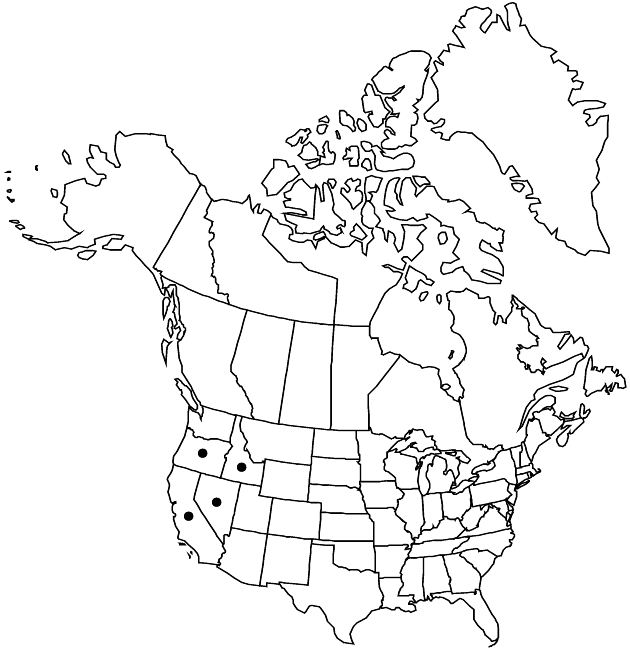Difference between revisions of "Eatonella nivea"
Proc. Amer. Acad. Arts 19: 19. 1883.
IllustratedEndemic
Basionym: Burrielia nivea D. C. Eaton in S. Watson, Botany (Fortieth Parallel), 174, plate 18, figs. 6–14. 1871
Treatment appears in FNA Volume 21. Treatment on page 349.
FNA>Volume Importer |
imported>Volume Importer |
||
| (3 intermediate revisions by 2 users not shown) | |||
| Line 6: | Line 6: | ||
|place=19: 19. 1883 | |place=19: 19. 1883 | ||
|year=1883 | |year=1883 | ||
| + | }} | ||
| + | |special_status={{Treatment/ID/Special_status | ||
| + | |code=F | ||
| + | |label=Illustrated | ||
| + | }}{{Treatment/ID/Special_status | ||
| + | |code=E | ||
| + | |label=Endemic | ||
}} | }} | ||
|basionyms={{Treatment/ID/Basionym | |basionyms={{Treatment/ID/Basionym | ||
|name=Burrielia nivea | |name=Burrielia nivea | ||
|authority=D. C. Eaton | |authority=D. C. Eaton | ||
| + | |rank=species | ||
|publication_title=in S. Watson, Botany (Fortieth Parallel), | |publication_title=in S. Watson, Botany (Fortieth Parallel), | ||
|publication_place=174, plate 18, figs. 6–14. 1871 | |publication_place=174, plate 18, figs. 6–14. 1871 | ||
| Line 36: | Line 44: | ||
-->{{#Taxon: | -->{{#Taxon: | ||
name=Eatonella nivea | name=Eatonella nivea | ||
| − | |||
|authority=(D. C. Eaton) A. Gray | |authority=(D. C. Eaton) A. Gray | ||
|rank=species | |rank=species | ||
| Line 50: | Line 57: | ||
|publication title=Proc. Amer. Acad. Arts | |publication title=Proc. Amer. Acad. Arts | ||
|publication year=1883 | |publication year=1883 | ||
| − | |special status= | + | |special status=Illustrated;Endemic |
| − | |source xml=https:// | + | |source xml=https://bitbucket.org/aafc-mbb/fna-data-curation/src/2e0870ddd59836b60bcf96646a41e87ea5a5943a/coarse_grained_fna_xml/V19-20-21/V21_873.xml |
|tribe=Asteraceae tribe Heliantheae | |tribe=Asteraceae tribe Heliantheae | ||
|subtribe=Asteraceae (tribe Heliantheae) subtribe Baeriinae | |subtribe=Asteraceae (tribe Heliantheae) subtribe Baeriinae | ||
Latest revision as of 20:15, 5 November 2020
Stems usually crowded in tufts. Leaves 10–2(0–30) × 3–8(–12) mm. Peduncles 1–35+ mm. Involucres 4–6+ mm. Ray corollas inconspicuous, laminae ± erect, 2–2.5 mm. Disc corollas 1.5–3 mm. Cypselae black, 2.5–3.5 mm, hairs on margins 0.6–1.2 mm; pappus scales 1.5–2.5 mm. 2n = 38.
Phenology: Flowering spring.
Habitat: Sandy or gravelly soils, often with sagebrush scrub
Elevation: 800–3100 m
Distribution

Calif., Idaho, Nev., Oreg.
Discussion
Selected References
None.
Lower Taxa
None.
